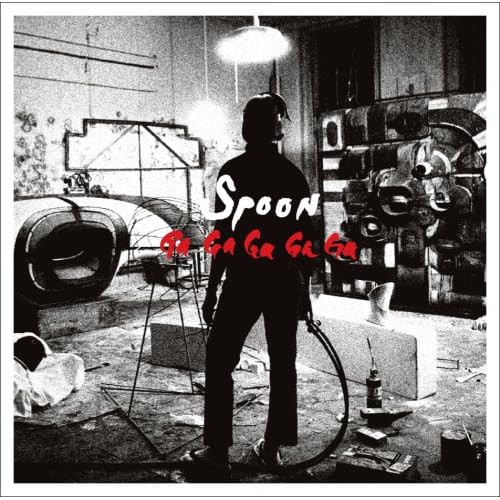
When bands change their sound, even slightly, separate camps will form to defend each side.
Old or new Beatles?
Joy Division or New Order?
Stones Roses or Second Coming (ok, so that one's not really a debate.)
for Interpol fans, the lines are already set:
Antics or Turn on the Bright Lights?
Why is this a debate? Is a change from atmospheric post-punk to a slightly cleaner rockier post-punk really a leap in musical philosophy? Something Awful's characterization was a favorite:
they no longer sound like they're ripping off Joy Division. In songs like "Slow Hands" and "Length of Love," it is apparent that they've now taken the great artistic leap of ripping off bands that ripped off Joy Division...
With all seriousness, Interpol has always had the same basic sound, just slightly tweaked from album to album. Our Love to Admire is yet another puff into the same balloon: They cover more surface area, but it's coming from the same mouth. Not necessarily a bad thing, if you like the mouth it's coming from. Paul Banks' vocal delivery is certainly what I'd call a good thing.
"Pioneer to the Falls" thankfully replaces "Next Exit" as an album opener. Gone is the cringe-worthy organ. A few tender piano keys set a tender opening which slowly builds into Interpol's trademark simplistic, but atmospheric guitar picking. Paul Bank's trademark gloom is made all the more evident during an acapella interlude: "Show me the dirt pile and I will pray that the soul can take three stowaways." The isolating lyrics are mitigated by a haunting mixture of piano, guitar and a somewhat distant sounding herald trumpet.
The whole album sounds a bit closer to Turn on the Bright Lites in production and overall effectiveness, so that's certainly a plus. "There's No I in Threesome" pounds with pleading and intensity throughout with bright piano and ghostly string like noises surround the production. More importantly, Banks sounds more heartfelt than ever during his almost tearful pleas, "Babe, it's time we gave something new a try/ though alone we may fight, so just let us be free tonight." It'd sound almost touching, if it wasn't about adding a little spice into the bedroom.
The band has it's glimpses of single appeasement, such as with "Heinrich Maneuver," and almost processed single, that sounds a bit out of place amidst the eerie whirring and howls that accompany the rest of the album, but as a driving single, it's quite effective.
"All Fired Up" hands us a precise rhythm to march to and attitude to match. As does "Mammoth" which uses a large bell to punctuate the beginning, middle and end of this "Lengths of Love" imitator. However, it certainly is more intense than "Lengths." Just as Banks asks "Just spare me the suspense," the song enters a calm introspective pause that seems to pain Banks even more. The song has more emotional highs than anything on "Antics," helped along by Banks' soaring, yet aching vocals.
However, for the rest of the album, the pulsating post-punk rock of songs like "PDA" and "Slow Hands" have given way to something a bit more detached and meandering.
Banks performance is far more versatile. While his Ian Curtis impression is always appreciated by goth rockers everywhere, the over-enunciated force with which Paul Banks seems to rip every word violently from his vocal chords subsides somewhat here. Whereas usually sounds close to spontaneous combustion when straining for notes, he often sings with affected vocals, lending a little more humanity to his normally demanding caterwaul. On "Wrecking Ball", Banks weaves his words through a chanting background, while reducing his representation to mere footnotes beneath a quickly fading orchestra, hinting at Interpol's first love, classical music.
"Lighthouse" isn't the best closer, however. It's an uncertain ending. The roughly strummed guitars and accompanying instruments come in and out, as if matching the rise and fall of the tide. Banks simply ponders with little urgency: "What do the waves have to say now?" Eventually the Doppler-style instrumentals cascade into brief, but triumphant wall of sound, before eventually dying off with little other fanfare. It's an experimental route to take, but promising, considering their soon-to-be tiresome calling card so far.
In short - this album is closer to Turn on the Bright Lights than Antics. Antics stripped down the sound and lost most of the passion that Interpol played with. Here, we have the passion, but much the same music procedure as on the last two albums. It may be somewhat of a retread, but one that at least satisfies more than a taste of their former glory.


